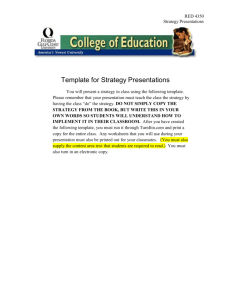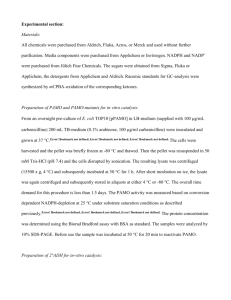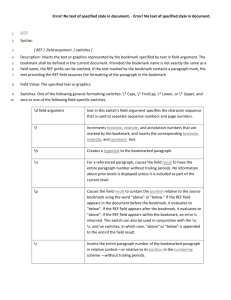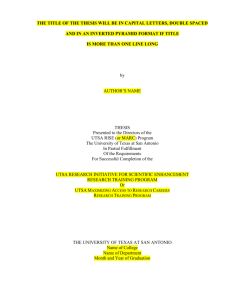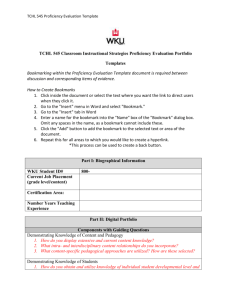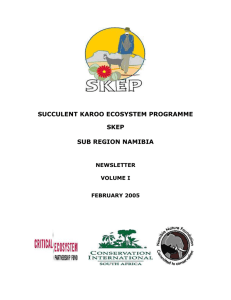SKEP NC with theory preempts
advertisement
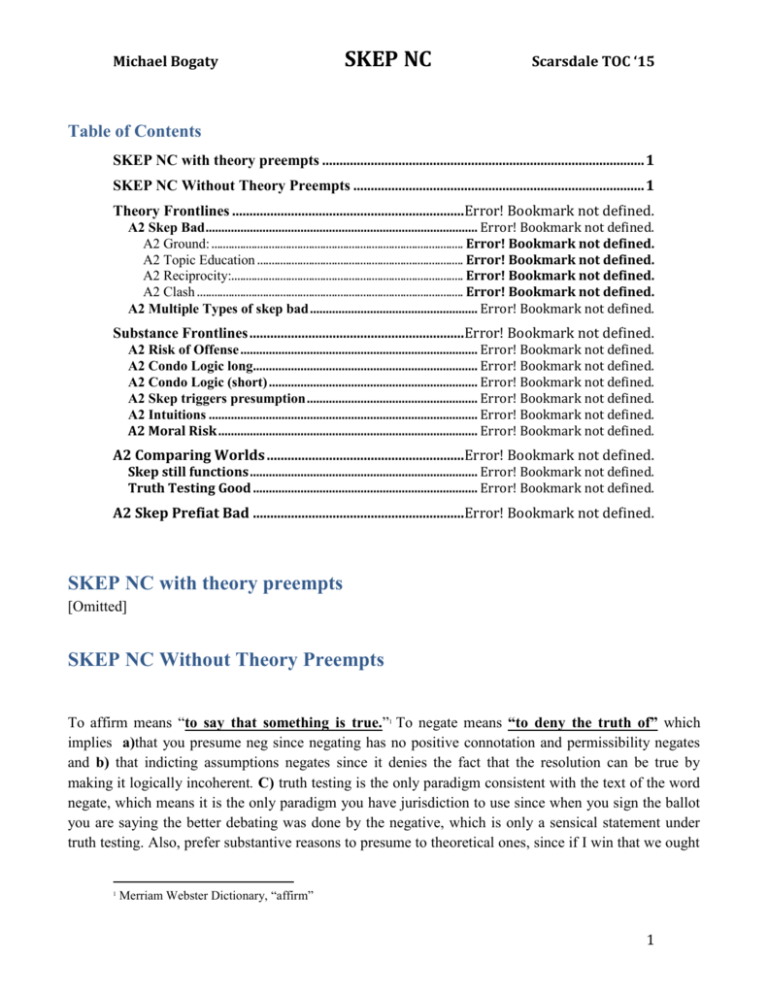
Michael Bogaty SKEP NC Scarsdale TOC ‘15 Table of Contents SKEP NC with theory preempts ............................................................................................. 1 SKEP NC Without Theory Preempts .................................................................................... 1 Theory Frontlines ...................................................................Error! Bookmark not defined. A2 Skep Bad ...................................................................................... Error! Bookmark not defined. A2 Ground: ........................................................................................ Error! Bookmark not defined. A2 Topic Education ........................................................................ Error! Bookmark not defined. A2 Reciprocity:................................................................................. Error! Bookmark not defined. A2 Clash ............................................................................................. Error! Bookmark not defined. A2 Multiple Types of skep bad ..................................................... Error! Bookmark not defined. Substance Frontlines ..............................................................Error! Bookmark not defined. A2 Risk of Offense ........................................................................... Error! Bookmark not defined. A2 Condo Logic long....................................................................... Error! Bookmark not defined. A2 Condo Logic (short) .................................................................. Error! Bookmark not defined. A2 Skep triggers presumption ...................................................... Error! Bookmark not defined. A2 Intuitions ..................................................................................... Error! Bookmark not defined. A2 Moral Risk .................................................................................. Error! Bookmark not defined. A2 Comparing Worlds .........................................................Error! Bookmark not defined. Skep still functions ........................................................................ Error! Bookmark not defined. Truth Testing Good ....................................................................... Error! Bookmark not defined. A2 Skep Prefiat Bad .............................................................Error! Bookmark not defined. SKEP NC with theory preempts [Omitted] SKEP NC Without Theory Preempts To affirm means “to say that something is true.”1 To negate means “to deny the truth of” which implies a)that you presume neg since negating has no positive connotation and permissibility negates and b) that indicting assumptions negates since it denies the fact that the resolution can be true by making it logically incoherent. C) truth testing is the only paradigm consistent with the text of the word negate, which means it is the only paradigm you have jurisdiction to use since when you sign the ballot you are saying the better debating was done by the negative, which is only a sensical statement under truth testing. Also, prefer substantive reasons to presume to theoretical ones, since if I win that we ought 1 Merriam Webster Dictionary, “affirm” 1 Michael Bogaty SKEP NC Scarsdale TOC ‘15 to see the resolution as false then the debate isn’t a tie – I did the better debating by showing we should negate. Additionally, presume neg 1) The Aff gets the last word in every debate; so the burden should be on the aff to ensure that there is still offense in the round in the 2AR. Don’t punish me for my opponent’s strategic choices 2) The neg needs presumption to check back spikey ACs, as the aff can take out entire swaths of neg speech time in seconds by extending blippy spikes, one of which the neg is bound to drop. This also prevents sketchy presumption triggers in AC’s. 3). there is only one possible way to prove something true, there are infinitely many ways to prove it false, which means that any given proposition such as the resolution is more likely false than true. Skep is true. First, linguistic skep: we can never know what a statement means so it is impossible for it to be true, Kripke Normally, when we consider a mathematical rule such as addition, we think of ourselves as guided in our application of it to each new instance. Just this is the difference between someone who computes new values of a function and someone who calls out numbers at random. Given my past intentions regarding the symbol ‘+’, one and only one answer is dictated as the one appropriate to ‘68+57'. On the other hand, an indefinite number of rules (even rules stated in terms of mathematical functions as conventional as ordinary polynomials) are compatible with any such finite initial segment. So if the tester urges me to respond, after 2, 4, 6, 8, . . ., with the unique appropriate next number, the proper response is that no such unique number exists, nor is there any unique (rule determined) infinite sequence that continues the given one. The although an intelligence tester may suppose that there is only one possible continuation to the sequence 2, 4, 6, 8,…, mathematical and philosophical sophisticates know that problem can then be put this way: Did I myself, in the directions for the future that I gave myself regarding [plus] ‘+’, really differ from the intelligence tester? True, I may not merely stipulate that [plus] ‘+’ is to be a function instantiated by a finite number of computations. In addition, I may give myself directions for the further computation of [plus] ‘+', stated in terms of other functions and rules. In turn, I may give myself directions for the further computation of these functions and rules, and so on. Eventually, however, the process must stop, with ‘ultimate’ functions and rules that I have stipulated for myself only by a finite number of examples, just as in the intelligence test. If so, is not my procedure as arbitrary as that of the man who guesses the continuation of the intelligence test? In what sense is my actual computation procedure, following an algorithm that yields ‘125’, more justified by my past instructions than an alternative procedure that would have resulted in ‘5'? Am I not simply following an unjustifiable impulse?" Of these problems apply throughout language and are not confined to mathematical examples, though it is with mathematical examples that they can be most I think that I have learned the term 'table' in such a way that it will [to] apply to indefinitely many future items. So I can apply the term to a new situation, say when I enter the Eiffel Tower for the first time and see a table at the base. Can I answer a sceptic who supposes that by `table' in the past I meant tabair, where a 'tabair' is anything that is a table not found at the base of the Eiffel Tower, or a chair found there? Did I course, smoothly brought out . think explicitly of the Eiffel Tower when I first `grasped the concept of' a table, gave myself directions for what I meant by `table'? And even if I did think of the Tower, cannot any directions I gave myself mentioning it be reinterpreted compatibly with the sceptic's hypothesis? Negates since it denies the truth of the resolution-no linguistic statement can ever be true since its impossible to determine its meaning. Second, No amount of subjective evidence can ever prove objective knowledge. Searle2 writes: [Y]ou could have the best possible evidence about some domain and still be radically mistaken. You could have the best possible evidence about other people’s behavior and still be mistaken about their mental states. You could have the best possible You could have the best possible evidence about your own perceptual experiences and still be mistaken about the external world. This is so because you could be dreaming, having evidence about the past and still be mistaken about the future. 2 Searle, John R. Mind, Language, and Society: Philosophy in the Real World. New York: Basic Books; 2000. (27). 2 Michael Bogaty SKEP NC Scarsdale TOC ‘15 hallucinations, be a brain in a vat, or be deceieved systematically by an evil demon. Strange situations, yes, but it is impossible to disprove the potentiality for any of these scenarios.” Moreover, we have positive reason to believe our perceptions of the world are false. Suppose Macbeth sees a dagger in front of him, when in fact there is no dagger. Since for Macbeth, there is no difference between his perception whether the dagger is really there or really not, and since our perceptions of the external world are relevantly similar to Macbeth’s, we have reason to believe that the things we perceive in the world do not exist. External world skep negates since we say governments ought pay a living wage we are asserting both that governments and living wages exist. Russel3 The distinction of primary and secondary occurrences also enables us to deal with the question whether the present King of France is bald or not bald, and generally with the logical status of denoting phrases that denote nothing. If "C" is a denoting phrase, say [denoting] "the term having the property F," then [the proposition] "C has the property [W]" means "one and only one term has the property F, and that one has the property [W]". If now the property F belongs to no terms, or to several, it follows that "C has the property [W]" is false for all values of [W]'. Thus [the proposition] "the present King of France is bald " is certainly false; and "the present King of France is not bald" is false if it means "There is an entity which is now King of France and is not bald,” but [the proposition] is true if it means "It is false that there is an entity which is now King of France and is bald" [is true]. That is, "the King of France is not bald " is false if the occurrence of "the King of France" is primary and true if it is secondary. Thus all propositions in which "the King of France" has a primary occurrence are false; [and] the denials of such propositions are true, but in them "the King of France" has a secondary occurrence. Thus we escape the conclusion that the King of France has a wig. Third, Determinism is true Inwagen4 “Physics teaches us that all physical changes transpire in accordance with the laws of nature. Now my firing of the gun, along with my aunt’s ensuing death, were physical events. So, if the dictates of science are to be accepted, these events were ultimately the outcome of events occurring in (say) 2 million B.C., together with the laws of nature. But it is not up to me what went on 2 million years ago. And it is not up to me what the laws of nature are either. Therefore, the consequences of these things, including my present actions, are not up to me either.” Morality or any system of obligations inherently must serve as a guide for action, since statements about obligations are only meaningful if they tell us how I am supposed to act. Otherwise, morality or any system of obligations lacks normativity since it doesn’t obligate me to act in a certain way. However, since changing one’s actions to adhere to moral norms is impossible in a deterministic world, people and governments cannot be moral agents, so there are no obligations, and you negate since it's the aff’s burden to prove a moral obligation, which is the definition of ought. Russel, Bertrand. “On Denoting.” Mind. <http://www.jstor.org/stable/2248381>. (490). 3 4 Vol. 14, No. 56. Oxford University Press; 1905. JSTOR. Inwagen, Van Peter. “Objectivist Theory of Free Will”. 3 Michael Bogaty SKEP NC Scarsdale TOC ‘15 Fourth, Justification only operates within a conceptual framework, but that framework contextualizes what counts as justification, so it’s impossible to compare between competing options. Joyce5 This distinction between what is accepted from within an institution, and “stepping out” of that institution and appraising it from an exterior perspective, is close to Carnap’s distinction between internal and linguistic frameworks” (as Carnap calls them) bring with them new terms and ways of talking: accepting the language of “things” licenses making assertions like “The shirt is in the cupboard”; accepting mathematics allows one to say “There is a prime number greater than one hundred”; accepting the language of propositions permits saying “Chicago is large is a true proposition,” etc. Internal to the framework in question, confirming or disconfirming the truth of these propositions is a trivial matter. But traditionally philosophers have interested themselves in the external question [of] – the issue of the adequacy of the framework itself: “Do objects exist?”, “Does the world exist?”, “Are there numbers?”, “Are the propositions?”, etc. Carnap’s argument is that [T]he external question, as it has been typically construed, does not make sense. From a perspective that accepts mathematics, the answer to the question “Do numbers exist?” is just trivially “Yes.” From a perspective which has not accepted mathematics, Carnap thinks, the only sensible way of construing the question is not as a theoretical question, but as a practical one: “Shall I accept the framework of mathematics?”, and this pragmatic question is to be answered by consideration of the efficiency, the fruitfulness, the usefulness, etc., of the adoption. But the (traditional) philosopher’s questions – “But is mathematics true?”, “Are there really numbers?” – are pseudo-questions. By turning traditional philosophical questions into practical questions of the form “Shall I adopt . . .?”, Carnap is offering a noncognitive analysis of metaphysics. external questions.15 Certain “ Since I am claiming that we can critically inspect morality from an external perspective – that we can ask whether there are any non-institutional reasons accompanying moral injunctions – and that such questioning would not amount to a “Shall we adopt . . .?” query, Carnap’s position represents a threat. What arguments does Carnap offer to his conclusion? He starts with the example of the “thing language,” To step out of the thing language and ask “But does the world exist?” is a mistake, Carnap thinks, because the very notion of “existence” is a term which belongs to the thing language, and can be understood only within that framework, “hence th[e]is concept cannot be meaningfully applied to the system itself.”16 Moving on to the external which involves reference to objects that exist in time and space. question “Do numbers exist?” Carnap cannot use the same argument – he cannot say that “existence” is internal to the number language and thus cannot be applied to the system as a whole. Instead he says that philosophers who ask the question do not mean material existence, but have no clear understanding of what other kind of existence might be involved, thus such questions have no cognitive content. It appears persons who dispute whether propositions [or] exist, whether properties exist, etc., do not know what they are arguing over, thus they are not arguing over the truth of a proposition, but over the practical value of their respective positions. Carnap adds that this is so because there is nothing that both parties would possibly count as evidence that would sway the debate one way or the other. that this is the form of argument which he is willing to generalize to all further cases: Thus, a framework can’t generate an obligation because it’s contingent on accepting that conceptual scheme, so I can escape the obligation by denying that scheme or adopting another. And, there’s no way to objectively compare schemes, so arguments about the superiority of different schemes can’t justify picking one. Takes out theory because voting on theory is contingent on accepting the conceptual theme of theory debate, which begs the question of why you except it in the first place. Fourth, moral theories must be either motivational or non-motivation. Double bind a) they are non-motivational and won’t be followed, so morality can’t guide action since guides need to be followed or b) morality is motivational and people will do what it says no matter what so its just descriptive of action, not providing an obligation. 5 Joyce, Richard. “The Myth of Morality” (2001). (p. 45-7) 4 Michael Bogaty SKEP NC Scarsdale TOC ‘15 5

